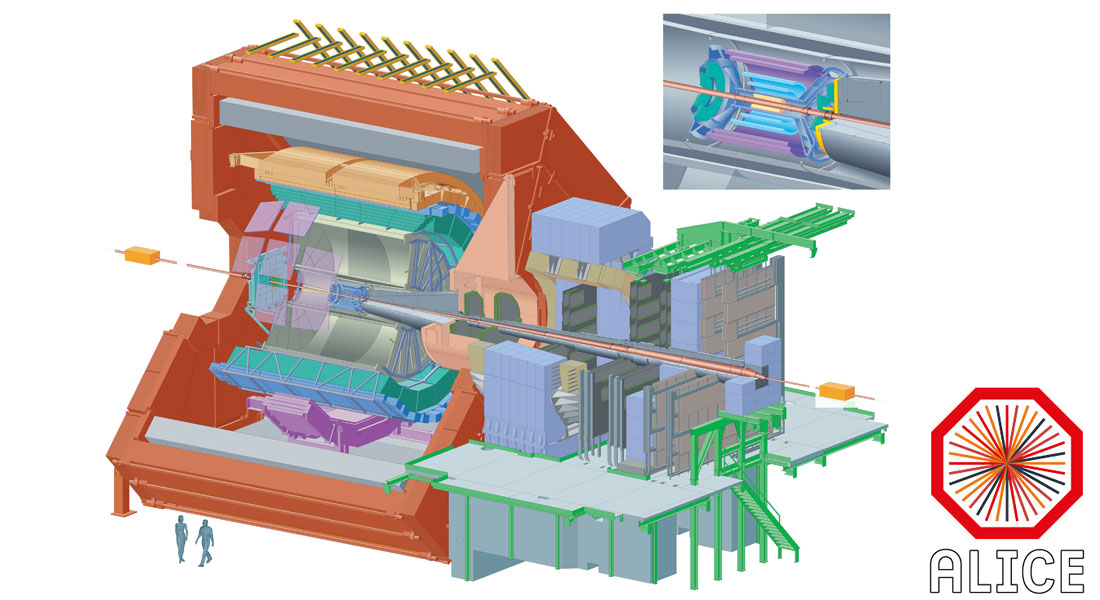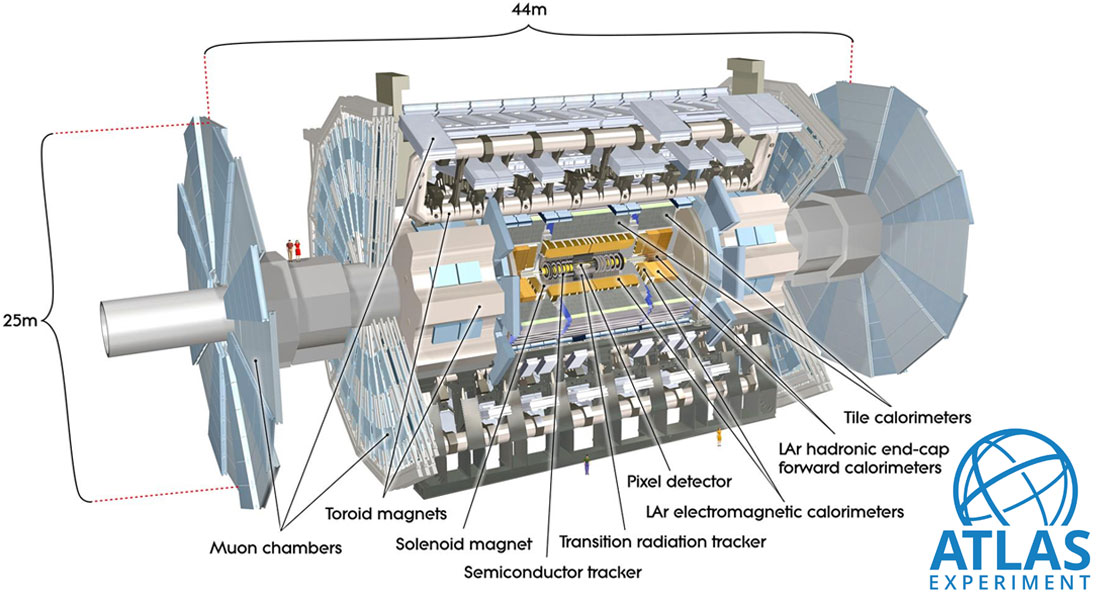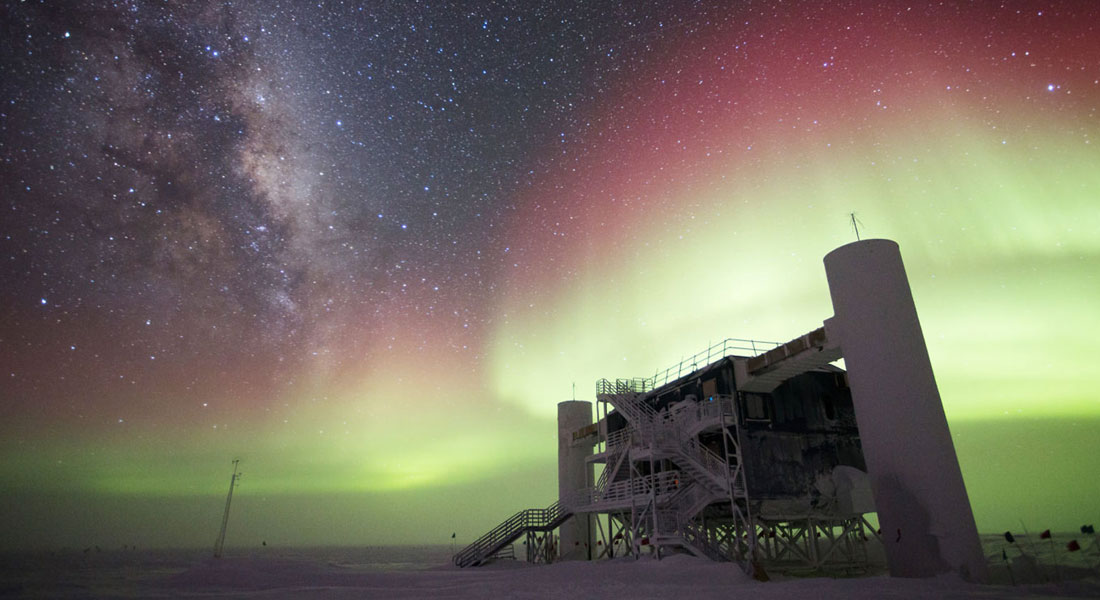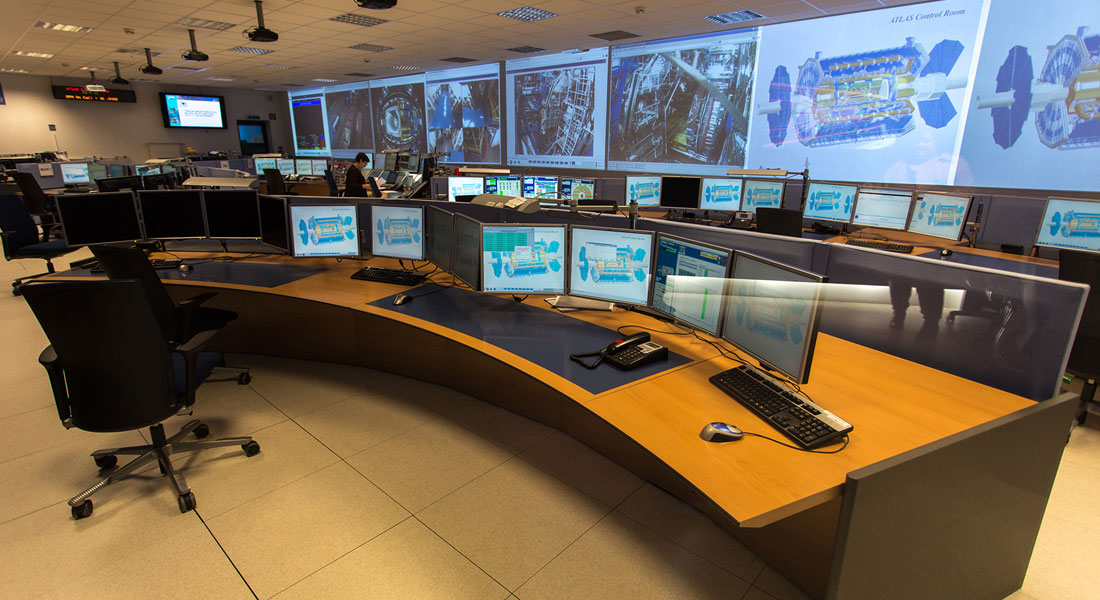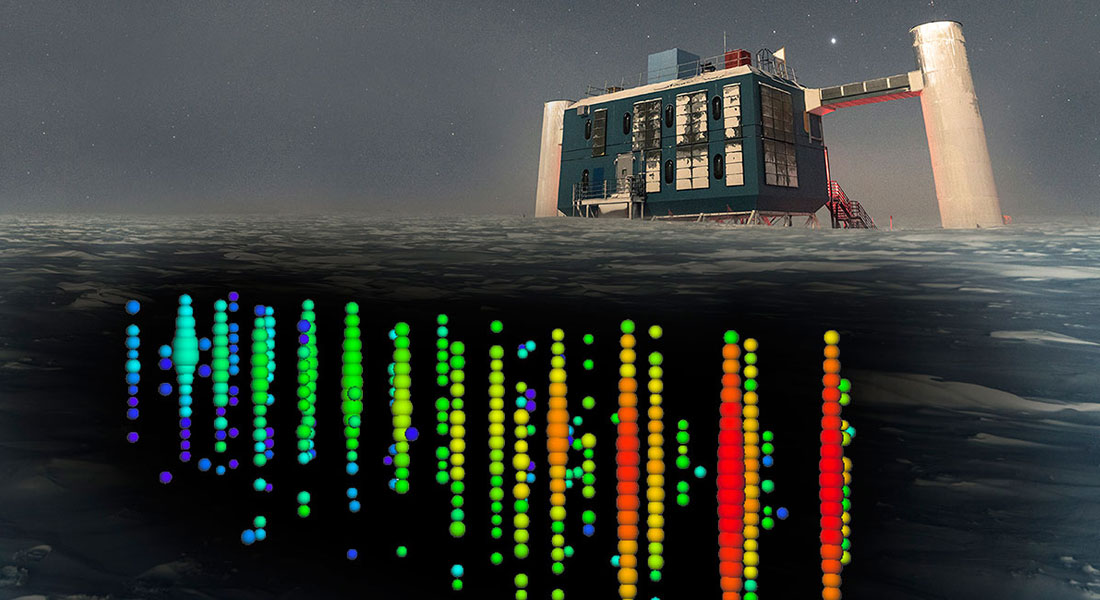Experimental Particle Physics
How was the universe created, which inflation scenario played out in the first split second, what happened during the quark-gluon plasma era? What is the source of the mass spectrum of fundamental particles of matter and forces? These are some of the questions particle physicists are looking for answers to.
The Particle Physicists work with the build up of matter in the early universe. They are searching for an explanation as to what the universe's smallest components were composed of in the first milliseconds after the Big Bang 14 billion years ago and what forces held them together.
At the Niels Bohr Institute in Copenhagen, there is extensive research in particle physics and cosmology, both theoretically and experimentally. Niels Bohr, together with Denmark and 11 other countries, helped establish CERN in 1954 - today the world's largest physics experiment, where researchers from all over the world search for the answer to the very big questions about the beginning of everything.
The researchers from NBI are also part of the IceCube Neutrino Observatory on the South Pole.
These experimental research groups work with what is called "High Energy Physics" and the term should be taken very literally. Their experiments take place at CERN, the European Laboratory for atom research in Geneva Switzerland, where a 27 km long underground atom accelerator operates at the colossally high temperatures such as existed in the seconds just after the big bang.
These high energies are necessary to break up the nucleus' elements into matter's tiniest components such as quarks, gluons, leptons etc. The Danish high energy physics group collaborates with several international research projects.
The Niels Bohr institute has many M.Sc. and PhD students. The students are closely attached to the research groups and supervisor, and have many social activities for International and Danish students.
If you are interested in studying Particle Physics, consider looking at these pages:
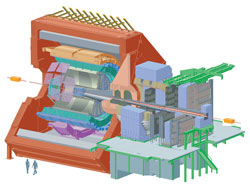 ALICE Experiment
ALICE Experiment
The ALICE Collaboration has built a dedicated detector to exploit the unique physics potential of nucleus-nucleus collisions at LHC energies. Our aim is to study the physics of strongly interacting matter at the highest energy densities reached so far in the laboratory. In such condition, an extreme phase of matter - called the quark-gluon plasma - is formed. Our universe is thought to have been in such a primordial state for the first few millionths of a second after the Big Bang.
More about the ALICE Experiment at CERN >>
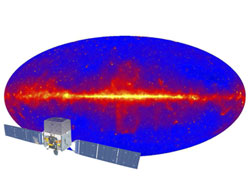 Astroparticle Physics Group
Astroparticle Physics Group
The interface between astrophysics & cosmology and fundamental physics is undergoing a revolution. Studies of the Hubble expansion, surveys of galaxies and maps of the cosmic microwave background have provided a wealth of data which have answered basic questions concerning the geometry and content of the universe.
More about the Astroparticle physics group >>
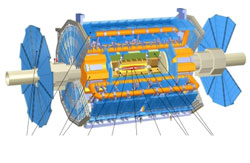 ATLAS Experiment
ATLAS Experiment
The ALICE Collaboration has built a dedicated detector to exploit the unique physics potential of nucleus-nucleus collisions at LHC energies. Our aim is to study the physics of strongly interacting matter at the highest energy densities reached so far in the laboratory. In such condition, an extreme phase of matter - called the quark-gluon plasma - is formed. Our universe is thought to have been in such a primordial state for the first few millionths of a second after the Big Bang.
More about the ATLAS Experiment >>
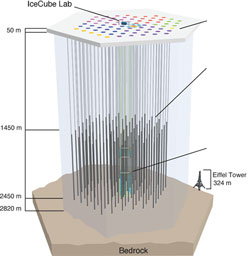 IceCube Experiment
IceCube Experiment
The IceCube Neutrino Observatory, embedded down to 2.5 km deep under the South Pole, is the world's largest and most sensitive ‘telescope' for high energy neutrinos. With a cubic kilometer of instrumented ice it is the largest particle detector in the world.
IceCube is a part of the subatomic group at the Niels Bohr Institute, based in the Discovery Center. The group includes both experimentalists and theorists (from the Niels Bohr International Academy). Indicated are selected topics of responsibility or research interests within neutrino physics and IceCube.
More about the IceCube Experiment >>
Particle and Astroparticle Phemonology
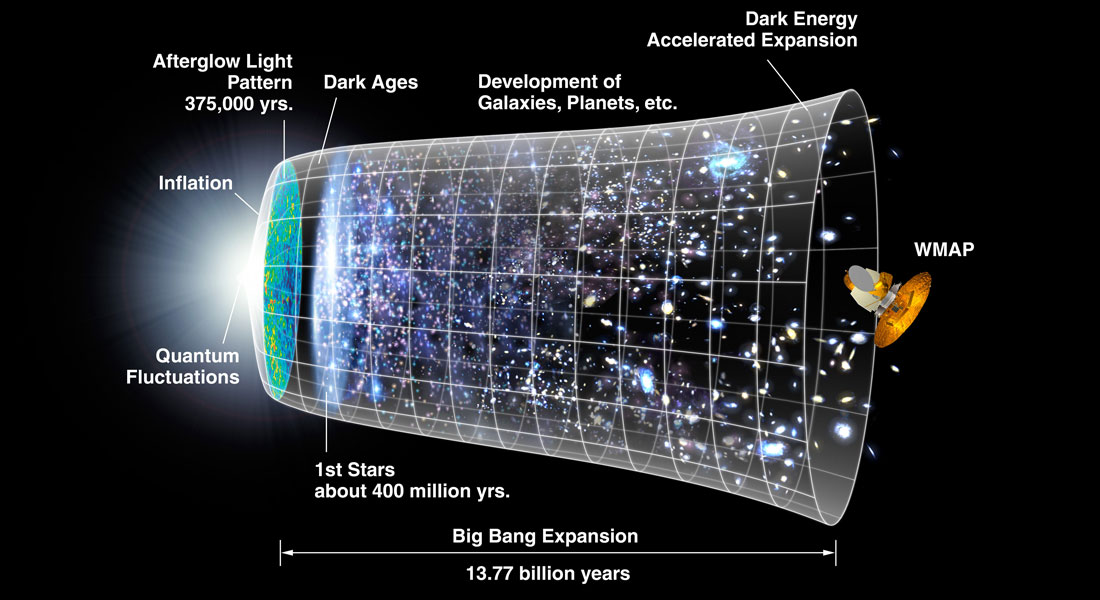
The scientific knowledge generally advances in two ways: top-down and bottom-up
"Phenomenological" particle physics is a "bottom-up theoretical research". One starts with what's observed and aims to build a holistic theory of Nature in a bottom-up fashion. In doing so one has to address not only particle physics challenges, but also the whole structure of the Universe, where particle physics affects cosmological observables in many aspects. In this way physics of micro- and macro-worlds becomes interconnect.
Want to try your first day as a real researcher? See more information about our IceCube MasterClass here.
National Instrument Center for CERN (NICE)
NICE is the National Instrument Center for CERN research. NICE supports Danish researchers in utilizing CERN's accelerator and detector infrastructure. Current activities include ALICE, ALPHA, ATLAS, CAST and ISOLDE. Read more
The Discovery center officially closed as the grant expired 31.12.2019.
Discovery Center
How was the universe created, which inflation scenario played out in the first split second, what happened during the quark-gluon plasma era? What is the source of the mass spectrum of fundamental particles of matter and forces? These are the questions we ask ourselves at the Discovery Center. Read more >>
Troels Christian Petersen, Associate Professor
Niels Bohr Building
Jagtvej 155A, 2200 København N.
Email: petersen@nbi.ku.dk
Phone: +45 26 28 37 39
Katrin Hjorth, Centre Administrator
Jagtvej155A, 2200 København N.
E-mail: khjorth@nbi.ku.dk
Phone: +45 35 33 32 49
Staff
| Name | Title | Phone | |
|---|---|---|---|
| Search in Name | Search in Title | Search in Phone | |
| Ahlers, Markus Tobias | Associate Professor | +4535328089 | |
| Bearden, Ian | Professor | +4535337626 | |
| Bøggild, Hans | Associate Professor Emeritus | +4535325286 | |
| Camplani, Alessandra | Assistant Professor | +4535334733 | |
| Dam, Mogens | Professor | +4535325385 | |
| Engelhardt, John Richard | Research Technician. | ||
| Feig, Degania Laura Skovsted | Student Assistant | ||
| Gaardhøje, Jens Jørgen | Professor | +4535325309 | |
| Groth, Kathrine Mørch | Guest Researcher | +4535333265 | |
| Gulbrandsen, Kristjan Herlache | Guest Researcher | +4535325351 | |
| Hansen, Jørgen Beck | Associate Professor | +4535325443 | |
| Hansen, Peter Henrik | Professor Emeritus | +4535325394 | |
| Hansen, John Renner | Professor Emeritus | +4535332001 | |
| Ioannou-Nikolaides, Johann Michael | PhD Fellow | +4535337297 | |
| Isidori, Tommaso | Postdoc | +4535329453 | |
| Jacquart, Marc Franck Emile | PhD Fellow | ||
| Jia, Shihai | PhD Student | ||
| Kampmann, Sofia Kundert | Student | ||
| Koskinen, D. Jason | Associate Professor | +4535326205 | |
| Lu, Zhiyong | Visiting Student | ||
| Machácek, Vojtech | PhD Fellow | +4535322533 | |
| Misciattelli Mocenigo Soranzo, L | Student Assistant | +4535326703 | |
| Morancho Tarda, Arnau | PhD Fellow | +4535325744 | |
| Murnane, Daniel Thomas | Postdoc | +4535336167 | |
| Mødekjær, Mikkel Møller | Visiting Student | +4535333408 | |
| Møller, Ian Pascal | Research Assistant | ||
| Nathanson, Nina Francesca | PhD Fellow | ||
| Nielsen, Børge Svane | Associate Professor Emeritus | +4535325433 | |
| Nielsen, Emil Gorm Dahlbæk | Postdoc | +4535335384 | |
| Pati, Preet Bhanjan | PhD Fellow | +4535322135 | |
| Pedersen, Norman Kløvedal | Enrolled PhD Student | ||
| Petersen, Troels Christian | Associate Professor | +4526283739 | |
| Ruchayskiy, Oleg | Associate Professor | +4535333380 | |
| Simeonov, Radoslav Rosenov | Enrolled PhD Student | ||
| Stuttard, Thomas Simon | Guest Researcher | ||
| Szabó, Dániel Dénes | Laboratory Assistant | ||
| Timiryasov, Inar | Assistant Professor | +4535325403 | |
| Urquía Calderón, Kevin Alberto | Postdoc | +4535325418 | |
| Wiglesworth, Graig | Assistant Professor | +4535328023 | |
| Wu, Wenya | PhD Student | ||
| Yu, Zhi | PhD Student | ||
| Zadorozhna, Lidiia | Postdoc Marie Curie | +4535337381 | |
| Zhao, Mingrui | PhD Student | ||
| Zhou, You | Associate Professor |

